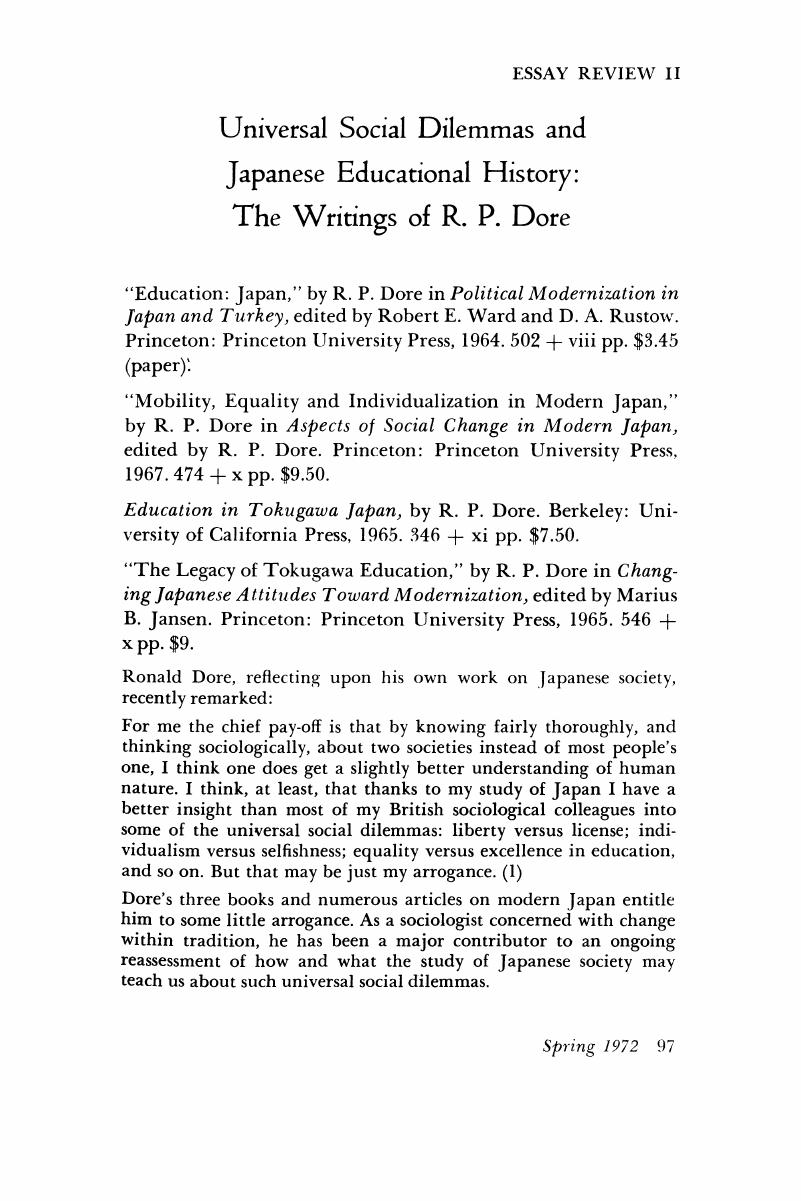No CrossRef data available.
Published online by Cambridge University Press: 24 February 2017

1. The Japan Times, February 6, 1970.Google Scholar
2. Dore, R. P., City Life in Japan (Berkeley, Calif., 1958); Land Reform in Japan (Berkeley, 1965).Google Scholar
3. Dore, R. P., “The Thought of Men: the Thought of Society,“ in Asian Cultural Studies, ed. Takeda Cho, Kiyoko, (Tokyo, 1962), 3: 75; see also “Talent and the Social Order in Tokugawa Japan,” Past and Present 21 (April 1962): 61–72.Google Scholar
4. One exception, the practice of temporary promotions and “acting ranks,” is discussed by Smith, Thomas C., in “‘Merit’ as Ideology in the Tokugawa Period,” in Aspects of Social Change in Modern Japan, ed. Dore, R. P., (Princeton, N. J., 1967), pp. 71–90.Google Scholar
5. Dore, R. P., Education in Tokugawa Japan (Berkeley. 1967), pp. 41–42.Google Scholar
6. Ibid., chap. II. The parellels with early modern English educational philosophy are pointed out by Dore. For other comparisons between English public schools and Confucian education in China, see Wilkinson, Rupert, Gentlemanly Power: British Leadership and the Public School Tradition (London, 1964).Google Scholar
7. Dore, , Education in Tokugawa Japan, p. 213.Google Scholar
8. Ibid., pp. 212–13.Google Scholar
9. Ibid.Google Scholar
10. Dore, , Aspects of Social Change in Modern Japan, p. 6.Google Scholar
11. R. P. Dore, “Education: Japan,” in Political Modernization in Japan and Turkey, ed. Ward, Robert E. and Rustow, D. A., (Princeton, N. J., 1964).Google Scholar
12. Dore, , Education in Tokugawa Japan, p. 315.Google Scholar
13. Dore, , Education in Tokugawa Japan, p. 315.Google Scholar
14. Dore, , “The Legacy of Tokugawa Japan,“ p. 110.Google Scholar
15. On this point, see Dore, R. P., “The Modernizer as a Special Case: Japanese Factory Legislation, 1882–1911,“ Comparative Studies in Society and History 9, no 4 (October 1969): 433–50; and Marshall, Byron K., Capitalism and Nationalism in Prewar Japan: The Ideology of the Business Elite (Stanford, Calif., 1967).Google Scholar
16. See, for example, Dore, R. P., “The Ethics of New Japan,“ Pacific Affairs 25, no. 2 (June 1952): 147–59.Google Scholar
17. Dore, , City Life in Japan, p. 393.Google Scholar